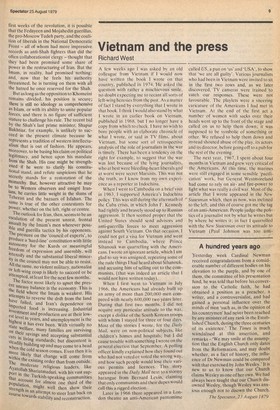Vietnam and the press
Richard West
A few weeks ago I was asked by an old colleague from Vietnam if I would now have written the book I wrote on that country, published in 1974, 'He asked the question with rather a Mischievous smile, no doubt expecting me to recant all sorts of left-wing heresies from the past. Asa matter of fact I stand by everything that I wrote in that book. I think I would also stand by what I wrote in an earlier book on Vietnam, published in 1968, but I no longer have a copy from which to check. I have no wish to bore people with an elaborate chronicle of what I wrote, or said in TV films, about Vietnam, but some sort of retrospective analysis of the role of journalists in the war is timely. There has been a tendency on the right for example, to suggest that the war was lost because of the lying journalists, who at best were bleeding-heart liberals and at worst were secret Marxists. This was not the truth, as I know from my own experience as a reporter in Indochina. When I went to Cambodia on a brief visit in 1963, 1 supported America's Indochina policy. This was still during the aftermath of the Cuba crisis, in which John F. Kennedy had rightly and bravely stood up to Russian aggression. It then seemed proper that the UnitedStates should send advisors and anti-guerrilla forces to meet aggression against South Vietnam. On that occasion, I could not get a visa for Vietnam and went instead to Cambodia, where ,Prince Sihanouk was quarrelling with the Americans. I wrote an ignorant article, which I am glad to say was unsigned, repeating some of the rude things I had heard about Sihanouk, and accusing him of selling out to the communists, (that was indeed an article that I would not have written today).
When' I first went to Vietnam in July 1966, the Americans had already built up an army of more than 200,000 men compared with nearly 600,000 two years later. During that first two months, I did not acquire any particular attitude to the war, except a dislike of the South Korean troops with whom I stayed for three or four days. Most of the stories I wrote, for the Daily Mail, were on non-political subjects, like children's homes and hospitals; but I did cause trouble with something I wrote on the general election that September. A polling officer kindly explained how they found out who had not voted or voted the wrong way, and how such people would lose their various permits and licences. This story appeared in the Daily Mail next to a stormy harangue from Bernard Levin, claiming that only communists and their dupes would call this a rigged election. Later in 1966 there appeared in a London theatre an anti-American pantomime called US, a pun on 'us' and 'USA', to show that 'we are all guilty'. Various journalists who had been in Vietnam were invited to sit in the first two rows and, as we later discovered, tv cameras were trained to catch our responses. These were not favourable. The playlets were a sneering caricature of the Americans I had met in Vietnam. At the end of the first act a number of women with sacks over their heads went up to the front of the stage and .called on us to help them down; it was supposed to be symbolic of something or other, We refused to help them down and instead shouted abuse of the play, its actors and its director, before going off to a pub for the rest of the evening.
The next year, 1967, I spent about four months in Vietnam and grew very critical of the Americans. At this time, the marines were still engaged in some sensible 'pacification' work, but General Westmoreland had come to rely on airand fire-power to fight what was really a civil war. Most of the article that I wrote appeared in the New Statesman which, then as now, was inclined to the left, and this of course got me the tag of an anti-American. People judge the politics of a journalist not by what he writes but by where he writes it; in fact I quarrelled with the New Statesman over its attitude to Vietnam (Paul Johnson. was too anti






























 Previous page
Previous page